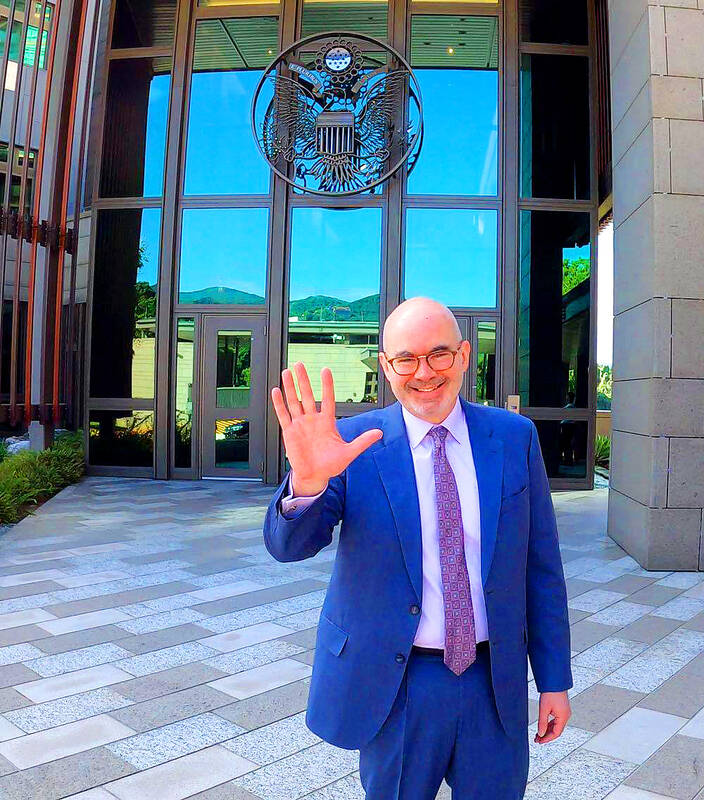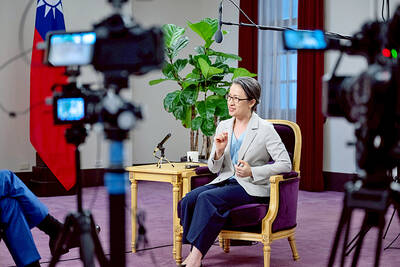Raymond Greene yesterday began work as director of the American Institute in Taiwan (AIT).
Greene, who served as deputy AIT director from 2018 to 2021, replaces Sandra Oudkirk as director of the institute, which represents US interests in Taiwan in the absence of official diplomatic ties.
“Director Greene looks forward to building on the successes of his predecessors and to further advancing the rock-solid US-Taiwan partnership,” the AIT said in a statement.

Photo courtesy of the American Institute in Taiwan
Greene, a member of the US Department of State’s Senior Foreign Service, had dedicated his 28-year career to advancing US diplomatic, economic and security interests in the Indo-Pacific region, the AIT said.
This is his third posting in Taiwan, it said.
Greene’s previous overseas assignments included serving as US consul general in Chengdu, China, and Okinawa, Japan.
He was also former chief of the Political-Military Affairs Unit at the US embassy in Tokyo, deputy chief of the AIT’s Political Section and a political officer in Tokyo and Manila.
He also served as director for Japan and East Asian Economic Affairs at the US National Security Council and director of the Office of Economic Policy in the state department’s Bureau of East Asian and Pacific Affairs.
Greene most recently served as deputy chief of mission at the US embassy in Japan.

China might accelerate its strategic actions toward Taiwan, the South China Sea and across the first island chain, after the US officially entered a military conflict with Iran, as Beijing would perceive Washington as incapable of fighting a two-front war, a military expert said yesterday. The US’ ongoing conflict with Iran is not merely an act of retaliation or a “delaying tactic,” but a strategic military campaign aimed at dismantling Tehran’s nuclear capabilities and reshaping the regional order in the Middle East, said National Defense University distinguished adjunct lecturer Holmes Liao (廖宏祥), former McDonnell Douglas Aerospace representative in Taiwan. If

TO BE APPEALED: The environment ministry said coal reduction goals had to be reached within two months, which was against the principle of legitimate expectation The Taipei High Administrative Court on Thursday ruled in favor of the Taichung Environmental Protection Bureau in its administrative litigation against the Ministry of Environment for the rescission of a NT$18 million fine (US$609,570) imposed by the bureau on the Taichung Power Plant in 2019 for alleged excess coal power generation. The bureau in November 2019 revised what it said was a “slip of the pen” in the text of the operating permit granted to the plant — which is run by Taiwan Power Co (Taipower) — in October 2017. The permit originally read: “reduce coal use by 40 percent from Jan.

‘SPEY’ REACTION: Beijing said its Eastern Theater Command ‘organized troops to monitor and guard the entire process’ of a Taiwan Strait transit China sent 74 warplanes toward Taiwan between late Thursday and early yesterday, 61 of which crossed the median line in the Taiwan Strait. It was not clear why so many planes were scrambled, said the Ministry of National Defense, which tabulated the flights. The aircraft were sent in two separate tranches, the ministry said. The Ministry of Foreign Affairs on Thursday “confirmed and welcomed” a transit by the British Royal Navy’s HMS Spey, a River-class offshore patrol vessel, through the Taiwan Strait a day earlier. The ship’s transit “once again [reaffirmed the Strait’s] status as international waters,” the foreign ministry said. “Such transits by

Taiwan is doing everything it can to prevent a military conflict with China, including building up asymmetric defense capabilities and fortifying public resilience, Vice President Hsiao Bi-khim (蕭美琴) said in a recent interview. “Everything we are doing is to prevent a conflict from happening, whether it is 2027 or before that or beyond that,” Hsiao told American podcaster Shawn Ryan of the Shawn Ryan Show. She was referring to a timeline cited by several US military and intelligence officials, who said Chinese President Xi Jinping (習近平) had instructed the Chinese People’s Liberation Army to be ready to take military action against Taiwan